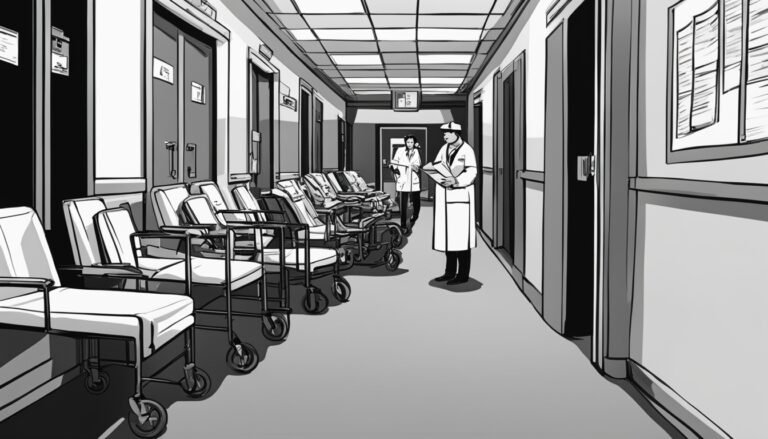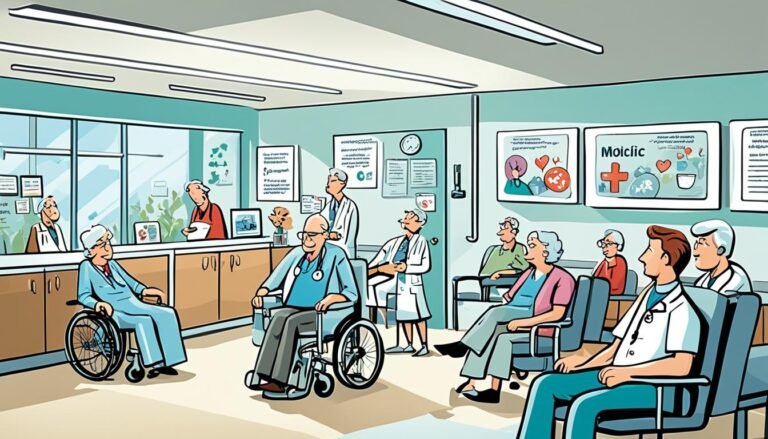Patient-Centred Care: Enhancing Patient Involvement in Ireland
Did you know that getting patients involved in healthcare is a big opportunity? In Ireland, we’re changing how we care for people. Now, patients are at the core of health services. This change aims to make care better and safer.
With more people having chronic diseases, healthcare needs to change. Putting patients first is key. Health groups like the Canadian Foundation for Healthcare Improvement agree. Already, Ireland is taking steps with the National Healthcare Charter and Strategy for Service Users.
Talking to patients about risks and getting them involved in their care is vital. It makes care better and saves money. Patient feedback has shown us where we can do better. The Health Research Board even funds projects that involve patients in research.
Key Takeaways
- Patient engagement is an underutilized resource in healthcare.
- Transforming to a patient-centred healthcare model improves outcomes and safety.
- Patient and family engagement are key levers in healthcare improvement frameworks.
- Communicating risks and involving patients in their care enhances care quality and cost.
- Patient feedback is crucial for identifying and addressing previously unrecognized areas of harm.
Introduction to Patient-Centred Care in Ireland
In Ireland, patient-centred care puts patients first in healthcare decisions. This method follows global standards, like those from the World Health Organization (WHO). It means patients’ needs and choices guide medical decisions, making healthcare more inclusive and responsive.
Healthcare policy in Ireland has changed to focus on patient care. In 2017, the Health Service Executive (HSE) started a reform program. This aimed at engaging the public and service users. The Sláintecare Report laid out a ten-year plan for healthcare reform.
This plan focuses on improving services, governance, and tracking progress towards universal healthcare. The changes show a move towards more democratic, transparent, and accountable healthcare systems. The goal is to make patients active in their healthcare, not just receive care.
Over 12,000 people from forty hospitals in Ireland shared their experiences in surveys. They pointed out areas needing improvement. For example, many felt they didn’t get enough time with doctors, and not all knew about their medicines’ side effects. Still, moving towards patient-centred care is a big step forward for Ireland’s healthcare.
Almost three in five people in Ireland have private health insurance, but it only covers 15% of health costs. This shows why reform is crucial for ensuring everyone gets quality care, insurance or not. HSE initiatives and policies are making big strides, making Irish healthcare patient-focused.
The Role of Patient Empowerment in Healthcare
In Ireland, making patients more involved in their healthcare is key. Studies show that patients with epilepsy often don’t take an active part in their care. This highlights the need for changes in healthcare that put patients in charge.
By giving patients a bigger role in making health decisions, we can see better health outcomes. This approach leads to more patient engagement.
Enhancing Patient Involvement
Getting patients more involved is crucial. They should be seen as active members of their healthcare team, not just receivers of care. Research in an Irish epilepsy service found that feeling empowered comes from feeling in control and making decisions together with healthcare providers.
This move from old-school care to a more collaborative approach is important. It shows how patients can be more involved in their care.
Importance of Healthcare Communication
Good communication in healthcare is key. It helps patients understand their health, treatment options, and the effects of their choices. In an Irish epilepsy service, research showed how important clear communication is.
It helps patients, their families, and healthcare workers work together better. This leads to more patient empowerment by filling knowledge gaps and helping with mental health. It also boosts patient advocacy in healthcare.
The Irish healthcare system, mainly funded by the public, can greatly benefit from these ideas. Using better communication strategies will help empower patients more. This leads to healthcare that is more responsive and includes everyone more.
Advantages of Shared Decision-Making
Shared decision-making means doctors and patients work together to make health care choices. This teamwork makes the health care experience better and leads to better health results. In Ireland, this approach helps patients and doctors work together, creating positive health experiences and outcomes.
Improving Healthcare Outcomes
When patients and doctors make decisions together, it brings many benefits. It ensures treatments fit the patient’s life and values, making them happier and more likely to follow the doctor’s advice.
A study looked at 1,057 patient visits and found only 9 percent made informed decisions. This shows we need to do better in involving patients in their care. When patients are involved, they can make better choices, leading to better health outcomes.
Challenges like complex treatments, patients not understanding health information, and doctors not getting paid for talking to patients can stop good communication. We need better ways to help patients take part in making decisions. When patients are involved, they feel important and help make decisions that are safer, better quality, and save money.
To get better health results, Ireland should focus on care that puts patients first. By working together, we can make sure health care is based on solid evidence and tailored to each patient. This leads to happier patients and better health outcomes.
Personalized Healthcare: A Key Component
Personalized healthcare in Ireland means treatments are made just for you. It’s not one-size-fits-all. This way, care is tailored to meet your health needs and what you prefer. It makes healthcare better and more effective for everyone.
Customizing Treatment Plans
Creating treatment plans starts with knowing you well. We look at your health history, genes, lifestyle, and what you want. This ensures treatments work well and match your values and goals. It also means you’re more likely to stick with your treatment and see good results.
Integrating Patient Preferences
Listening to what you want is key in personalized healthcare. Doctors talk with you about your treatment choices and what you hope to achieve in health. This makes sure your care respects your wishes and values. It leads to happier patients and better health outcomes.
Patient-Centred Care: Enhancing Patient Involvement in Ireland
Ireland is making a big push to put patients at the heart of healthcare. This means more involvement in every step of healthcare. Healthcare workers are taking part in Continuous Professional Development (CPD) activities to improve patient care.
Among Irish GPs, 73.9% see CPD as key to better patient care. And 74.9% say CPD has helped them manage patients better.
Many GPs, 56.4%, believe courses and conferences are best for improving patient care. This shows a strong focus on making healthcare better. The survey also found differences in opinions based on gender and age.
Female GPs were more likely to see the value in CPD. This shows how important it is to listen to patients and their needs.
Small group learning is very effective, with 97.1% of participants using it to get better at their job. And 86.3% changed their work because of it. These numbers show how crucial it is to focus on what patients want in healthcare.
The Impact of Patient and Family Engagement
In Ireland, patient and family engagement are key to better healthcare. By focusing on family-centered care, we see how important family is in supporting patients. When patients and their families are involved, care gets better, treatment plans work better, and health outcomes improve.
Family Carers Ireland is leading the way with Patient and Public Involvement (PPI) in research. Family carers bring real-life experience to the table, helping in many ways. This not only helps carers but also gives researchers new insights and improves trust in research.
The ‘Family Carer Public & Patient Involvement Panel’ shows a strong commitment to family-centered care. It lets family carers work with researchers. Workshops help carers share their skills. The Family Carers Research Advisory Network makes it easy for researchers to connect with carers, making research deeper and wider.
Big events like the webinar on Patient-Centered Care & Patient Engagement highlight the importance of engaging patients and families. Speakers like Andrew Spiegel and Dr. Pamela Cipriano showed how involving family improves patient experience and health.
The World Patients Alliance and the International Council of Nurses push for patient-focused care. Dr. Cipriano talked about nurses’ key role in patient-centered care. This shows how patients and families are seen as crucial in healthcare worldwide.
Adding patient and family engagement to healthcare makes care better and improves outcomes. This approach is key for top-notch healthcare in Ireland and everywhere.
Strategies for Implementing Patient-Centred Care in Ireland
Ireland has taken steps to make patient care more focused on the patient. One key move was the National Healthcare Charter. This document makes sure patients are involved in their care. It talks about being open, taking responsibility, and respecting each other.
The charter also helps patients and families take part in making care decisions. This leads to better health outcomes.
National Healthcare Charter
The National Healthcare Charter is a key part of Ireland’s healthcare plan. It stands for patient care that is clear and responsible. It also demands respect between patients and healthcare workers.
This charter has helped improve patient care. For example, a study found 16 key things needed for good care. These include good leadership and enough resources.
Clinical networks and national programs have also made patient care better. They bring together professionals from different places. This leads to new ways of giving care.
Patients who help make decisions often pick treatments that fit their values. These treatments are often less invasive and cheaper.
Quality Improvement Initiatives
Improving healthcare quality is a big part of patient care in Ireland. Many efforts are being made to keep getting better. For example, a list of 222 things that help give great care was made.
Getting patients involved in their health has shown to make them stick to their treatment better. It also cuts down on emergency hospital visits. Rules from the University of Galway make sure these efforts respect patients’ rights.
Ireland is moving towards a more complete view of health, focusing on the whole person. This approach is based on George Engel’s ideas.
The National Healthcare Charter and efforts to improve quality are key to Ireland’s healthcare plan. They aim to make healthcare better for everyone. This includes making sure patients and their families are part of the care team.
Technological Advancements Facilitating Patient Involvement
In Ireland, new tech is changing how patients interact with healthcare. Health IT and telehealth are key to modern care that focuses on the patient.
Health Information Technology
Health IT is crucial for better patient engagement. It gives patients easy access to their health data. This helps them make informed choices and manage their health better.
A study found that health IT makes handling data easier and improves healthcare. This change is vital for better healthcare and more patient involvement in Ireland.
Telehealth and Telemedicine
Telehealth and telemedicine have changed patient care, especially by breaking down distance barriers. Patients can now get medical advice and care at home.
A study in the Australian Health Review showed these benefits. They make healthcare more accessible, cut down on travel time, and lower costs. Telemedicine also keeps patients involved in their care, which is key for good patient care.
Telehealth and telemedicine make it easier for patients and doctors to talk. This keeps patients at the center of their healthcare, improving care quality and patient involvement.
Barriers to Patient-Centred Care in Ireland
Ireland’s healthcare system is making strides in patient-centred care but still faces big challenges. To overcome these barriers, we need a well-thought-out plan. We’ll look at the main challenges and why teaching patients is key to better care.
Systemic Challenges
There are many hurdles to making patient-centred care work. These include things like not enough staff, not enough money, and too many rules. For example, there aren’t enough doctors and nurses, which can hurt how well care is given and the health of patients.
Money issues and red tape also make it hard to bring in patient-focused care. The World Health Organization talked about the importance of primary care in 2008. But, we still need to do a lot to make sure care matches this goal.
Getting communities involved in primary care is also key, as Neuwelt P showed in 2012. But, we’re not using this approach as much as we should.
Patient Education and Awareness
Teaching patients is another big challenge in patient-centred care. Many patients don’t know enough to make good care choices. This comes from not having strong education in healthcare.
The Health Canada Policy Toolkit from 2010 and a 2001 report by the Department of Health stressed the need for better education. This helps patients and the public get involved in health care.
Teaching patients more can make them take a bigger part in their care. It can also cut down on health problems like infections, which are a big issue in many countries. These infections are often preventable, showing how important good patient education is.
To get better patient-centred care in Ireland, we need to work on these big challenges and teach patients more. This will make patients more involved and help the healthcare system do a better job for them.
Case Studies: Success Stories in Patient-Centred Care
In Ireland, many projects show the value of patient-centred care. They use real-life examples to prove its worth. These stories cover everything from small local projects to big changes in healthcare.
One example is from St Michael’s House, focusing on adults with intellectual disabilities. It was led by six partners who wanted to involve patients more. They got funding and made big improvements in patient power and knowledge. They even set up a group with staff and patients to make decisions together.
Another story is about six workshops for 30 parents at Barnardos projects. The parents, mostly White Irish mothers, gave valuable feedback. This helped the parents grow in leadership and communication skills.
They plan to share their stories in Autumn 2024. This shows how patients and families are being heard in healthcare planning.
The ‘quality knowledge corridor’ project by eHealth Ireland is another example. It came up with 45 IT solutions for healthcare, like an app for mental health. This shows how technology can improve patient care and make it better for patients.
At Beaumont Hospital in Dublin, they used a new device for epilepsy patients. This shows how a well-planned healthcare system can work well. They also use online patient records to make quick decisions and avoid delays.
This project is a big win for patient care. It shows the good things that come from using technology and focusing on patients.
These stories from Ireland are very inspiring. They show how patients, families, and technology can change healthcare for the better. They encourage other places to try patient-focused care too.
Future Directions and Emerging Trends
The evolution of patient-centred care in Ireland is closely tied to the rapid advancements in technology and the global push towards sustainable healthcare practices. We see a bright future with AI and machine learning leading the way. These technologies will shape how we approach healthcare, making it more sustainable.
Integration of AI and Machine Learning
AI in healthcare is set to change everything. It will improve predictive analytics, personalized medicine, and how doctors make decisions. A study showed that AI could give patients more control over their care, making it more personal.
AI can also make healthcare operations smoother. It can handle complex tasks, freeing up doctors to focus on what matters most: caring for patients.
Sustainable Healthcare Models
Healthcare sustainability is key to a strong and adaptable system. It means being kind to the environment and managing resources well. Studies show that getting patients involved helps make healthcare more sustainable.
By using AI and focusing on sustainability, we can make healthcare better. Hospitals and clinics can become more efficient, offering top-notch care with less harm to the environment.
The Institute of Medicine wants 90% of medical decisions to be based on solid, up-to-date information by 2020. This goal highlights the importance of AI and sustainable healthcare. Together, they promise a future of care that’s more inclusive, efficient, and focused on the patient.
Conclusion
The push for patient-centred care in Ireland shows a deep commitment to a healthcare system that meets patient needs. This effort combines policy changes, tech advancements, and a strong focus on patient advocacy. Together, they create a space that puts personalized care first and values patient involvement.
Studies from internal medicine units show that healthcare workers support person-centered care. They gave it high scores for prerequisites and the practice environment. Yet, there’s room for growth, especially in supporting systems, which scored lower.
This shows the need for ongoing improvement and better support for patient-centred care.
Clinical trials highlight the importance of patient advocacy and involvement. Ireland lags behind countries like Finland and Denmark in trial numbers. Yet, platforms like Whyze Health are helping by giving patients easy access to health info and letting them take part in clinical trials.
As Ireland’s healthcare changes, keeping patient-centred care at the core is key. This means a strong focus on patient involvement, clear communication, and making decisions together. With ongoing advocacy, tech progress, and policy changes, Ireland’s healthcare future looks promising for better patient care and system improvement.
Source Links
- Patient Engagement In Health and Healthcare: A literature review. Jan 2020
- The public and patient involvement imperative in Ireland: Building on policy drivers
- Patient‐centred care is a way of doing things: How healthcare employees conceptualize patient‐centred care
- Co-Creating Descriptors and a Definition for Person- Centred Coordinated Health Care: An Action Research Study | International Journal of Integrated Care
- Exploring Dimensions of Empowerment from the Patients’ Perspective in One Specialist Epilepsy Service in Ireland
- Patient Empowerment: Redefining Healthcare in a Modern Era
- Patient-Centered Communication and Shared Decision Making – Delivering High-Quality Cancer Care
- Why patient-centered care is so important
- Frontiers | The public and patient involvement imperative in Ireland: Building on policy drivers
- Public and Patient Involvement in Research (PPI)
- Does continuing professional development enhance patient care? A survey of Irish based general practitioners: Successful implementation of mandatory CPD in Irish General Practice
- Does continuing professional development enhance patient care? A survey of Irish based general practitioners : Successful implementation of mandatory CPD in Irish General Practice – PubMed
- Family Carers Ireland
- Webinar: Patient Centered Care and Patient Engagement – World Patients Alliance
- COVID-19: Public and patient involvement, now more than ever
- National clinical programmes in the Republic of Ireland: a qualitative study of acute hospitals
- Strategies that facilitate the delivery of exceptionally good patient care in general practice: a qualitative study with patients and primary care professionals – BMC Primary Care
- Digital Transformation in Healthcare: Technology Acceptance and Its Applications
- UK & Ireland: Advancing Quality and Patient Safety
- Patient and Public Involvement in Technology-Related Dementia Research: Scoping Review
- Exploring levers and barriers to accessing primary care for marginalised groups and identifying their priorities for primary care provision: a participatory learning and action research study
- Patient involvement in the implementation of infection prevention and control guidelines and associated interventions: a scoping review
- Accelerating Healthcare Transformation through Patient-Centred MedTech Solutions – IBM UK & Ireland – Blog
- Case Studies – PPI Ignite Network
- Enterprise Case Study: Using IT to Improve Ireland’s Public-Sector Healthcare
- Epilepsy EPR – Chronic Disease Management Case Study
- Challenges and promising solutions to engaging patients in healthcare implementation in the United States: an environmental scan
- Evidence-based practice education for healthcare professions: an expert view
- Perspectives on the Person-Centered Practice of Healthcare Professionals at an Inpatient Hospital Department: A Descriptive Study
- WhyzeHealth: Improving Access and Participation in Clinical Trials in Ireland, a Patient-Centred Digital Health Platform | WHYZE Health








